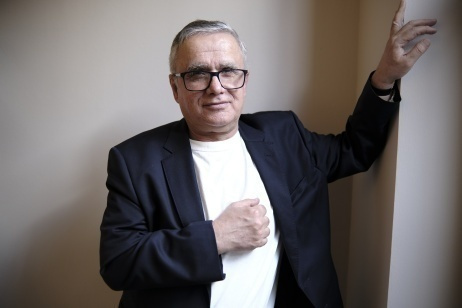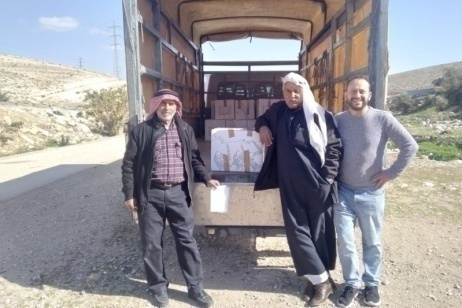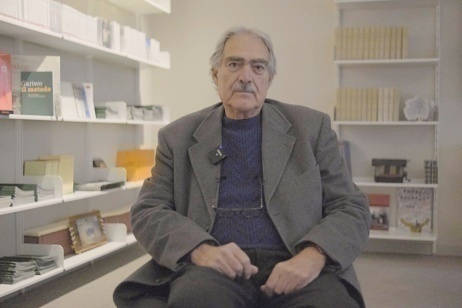«We are still trapped in this tragic and brutal time. It is extremely hard to see light at the end of the tunnel. And especially to “navigate” sufferings emerging on a daily basis. Personally, I feel I can draw a lot of strength from being part of Rabbis for Human Rights, an organisation the vision of which is undoubtedly linked to the current political situation, which is however rooted in Jewish values of respect for human rights and the sacredness of each human life».
Anton Goodman, a member of the staff of Rabbis for Human Rights, video called in Jerusalem, explains first of all that the priority for the association is now to «help create a sort of “moral direction”», because «such a horizon seems to be really far away».
He then goes on to say: «This is a very important issue for our rabbis: how do our actions reflect our deepest values in this time of war?».
Women and men rabbis of different currents
The organisation - founded in 1988, during the first Intifada – has now 160 Israeli men and women rabbis from different currents of Judaism at its head. It was hit hard by Hamas attacks in southern Israel of 7th October. Several members experienced those tragic hours first hand. Loved ones were killed.
And yet, in the hours immediately following those massacres, the line chosen was one of (albeit arduous) pursuit of dialogue, non-violence and protection of the weakest.
Personal responsibility
«Of course, today ceasefire must be the priority», Anton continues, «getting humanitarian aid into the Gaza Strip, obtaining the return of hostages through a coordinated agreement between the parties... but we do not make these kinds of decisions: we do not have the power to carry out these important steps. However, through actions on a smaller scale, we can bring to light the values I mentioned at the beginning: respect for and protection of all human life, first of all. We can bring these values into existence. Therefore, much of our current work revolves around that».
Anton explains the three main initiatives that the organisation is carrying out.
Planting justice
During the month of January, the “Planting justice” project was launched, involving Israelis and Palestinians, planting side by side olive trees in Palestinian villages in the West Bank that have been damaged by violence perpetrated by extremist settlers.
Every Friday, a group of rabbis and activists travel to one of the Palestinian villages affected by such violence, coordinating with the local community. About a thousand trees have been planted so far.
«We have recently been, for example, to the village of Burin, south of Nablus. About a month ago, farmers from Burin sent us a video showing a group of settlers burning olive trees in the village. We therefore decided to go back there and bring back our Jewish values in response to those same values that had been trampled on so horribly. It was a very meaningful gesture for us» says Anton.
He adds: «We also went back to al-Sawiya, another community in the Nablus area, where a couple of months ago one of the farmers, Bilal Salah, was killed by settlers while picking his olives. For us, going back there, planting trees together, is a message of solidarity and, at the same time, hope for the future».
A symbol of peace
Anton explains that olive trees have a plethora of meanings in both Jewish and Palestinian culture, from both a practical and spiritual point of view. Apart from being the largest source of income for Palestinian farmers, of course, olive trees embody the connection to the Palestinian land and, in parallel, the connection to the land of Israel for Jews.
They are also a symbol of peace and trees that live for hundreds of years («So, hopefully, they will survive long beyond our lifetime…»).
The role of different faiths
The second area in which the organisation goes on investing much time and energy is that of interreligious dialogue.
In December, when the Jewish holiday of Hanukkah, the festival of lights, was celebrated, moments of prayer, reflection and discussion were organized, which brought together leaders and members of Jewish, Christian and Muslim communities. The meetings were held in four cities in Israel: Jerusalem, Haifa, the Bedouin town of Rahat, and a northern Arab city.
«Such moments are a “safe space” for interaction between Jews and Palestinians. The terrible loss of life that we have suffered as a result of the war is also significantly damaging Jewish-Palestinian relations in our society», Anton notes. «These meetings have given people the opportunity to come together and share what they believe in and transcend borders, lines of separation that exist on an ethnic basis».
Humanitarian aid
Eventually, since the end of October, Rabbis for Human Rights has organised a humanitarian aid programme for families that are the most in need.
Over two thousand parcels containing food and staples have been delivered so far to Palestinian families in need in the West Bank, including unrecognised Bedouin villages in Negev and shepherd communities in the Jordan Valley threatened by the violence perpetrated by settlers.
«It is not easy - Anton concludes - but we are confident that, together, we will go on building solidarity, a solidarity that is based on the sacredness of human life and the need for peace».
In the cover photo Anton Goodman is portrayed while delivering humanitarian aid to the Jahalin community in the Judean desert. Thanks to Anton Goodman and Giulia Ceccutti for their courtesy.



.jpeg)



